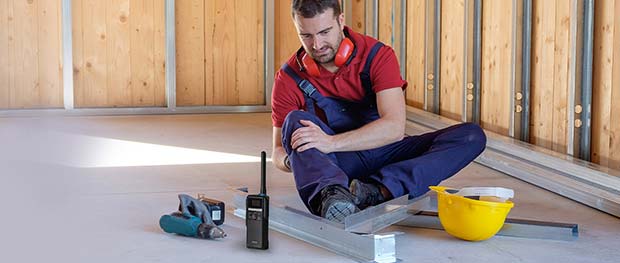How adapting work environments in response to COVID-19 measures could mean more lone worker situations due to fewer staff- Hytera explains how to still keep site staff safety high, when headcount is low.
 The COVID-19 pandemic has drastically reduced the number of employees going into work due to home working, self-isolation due to symptoms or exposure to the virus or in some cases due to sector operational guidelines.
The COVID-19 pandemic has drastically reduced the number of employees going into work due to home working, self-isolation due to symptoms or exposure to the virus or in some cases due to sector operational guidelines.
Those who are still attending the workplace must adhere to social distancing measures to minimise face-to-face interactions with colleagues or members of the public.
Organisations and businesses having to operate with less staff has led to an increase in the number of lone workers.
Employers have a duty of care to employees and a legal responsibility to provide a safe and effective work environment and are therefore having to assess whether there is a significant increase in risk to workers and, in particular, lone workers, because of changed working conditions.
Risks include exposure to increased levels of work-related violence and accidents, and higher stress levels induced by increased feelings of isolation and potentially higher workloads, which may affect the mental health of staff.
The ability of staff to communicate quickly with colleagues, supervisors, or the emergency services, is of even greater importance under the current conditions. Once employers have reorganised the workplace to implement social distancing measures, the need to review workplace communications is vital.
Hytera two-way Digital Mobile Radios (DMR) and Push-to-Talk over Cellular (PoC) devices provide the perfect social distancing tools. Radios support individual, group, broadcast and emergency calls, which enables workers to operate efficiently while still adhering to social distancing rules.
The ability to make group calls enables business relevant information or warnings to be quickly imparted to large numbers of staff at the same time.
Radios also keep staff safer, as many more people can be alerted via the same call or alarm if a colleague is in trouble. The radios are designed to be robust, durable and highly reliable, so they will not fail on the job. This makes radios much more effective than mobile phones or desk phones.
In addition to the emergency alarm button, many radios also support Man Down and Lone Worker alarms, which will automatically send an alert under certain conditions even if the radio user is incapacitated.
Integrated GPS technology will also pinpoint the worker’s whereabouts and send a precise location back to the control centre or supervisor, so help can be quickly and accurately directed to the right place.
Hytera body worn cameras also help reduce the workplace risks to staff, and lone workers in particular. Bodycams complement fixed CCTV to provide additional video surveillance, as they are mobile and can cover blind areas. They also help to enforce social distancing, as they provide solid visual evidence of staff or members of the public who are flouting the rules.
There have been many reports of increased verbal and physical assaults on workers during the pandemic. Bodycams can help to de-escalate or deter aggressive behaviour, as people often calm down if they know they are being filmed. Obviously, if staff do suffer from aggressive behaviour, the video footage will provide evidence to back up their version of events and can be used in court to prosecute the perpetrator.
Hytera radios provide the perfect way for employers to cope with COVID-19 lockdown procedures and the changed working environment. They provide efficient, highly reliable communications, which mean lone workers do not ever have to feel alone.




Comments are closed.